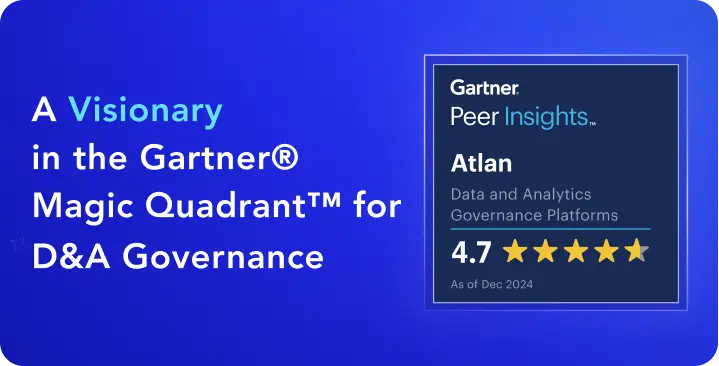IFRS 17 Compliance: It’s Benefits, Requirements & More!

Share this article
One of the most impactful challenges that underscore the importance of IFRS 17 compliance is the risk of “erosion of investor confidence and market valuation.”
Non-compliance or poor implementation of IFRS 17 can lead to less transparent, inconsistent, and incomparable financial reporting, severely undermining investor confidence in an insurance company.
For this reason, the implementation of the new IFRS 17 accounting standard for insurance contracts represents one of the most significant tasks in financial reporting for insurance companies.
Rather than viewing IFRS 17 simply as a compliance exercise, insurers should leverage it as a catalyst for strengthening data governance, financial discipline, and competitive positioning.
Modern data problems require modern solutions - Try Atlan, the data catalog of choice for forward-looking data teams! 👉 Book your demo today
In this article, we will explore:
- What is IFRS 17 compliance?
- Key things to keep in mind for IFRS 17 compliance
- Essential requirements for complying with IFRS 17
- Impact of IFRS 17 non-compliance
- Benefits of IFRS 17 complinace
Ready? Let’s dive in!
Table of contents #
- Understanding IFRS 17 compliance: Why does it matter?
- 10 Key considerations for achieving IFRS 17 compliance
- 8 Essential requirements for achieving IFRS 17 compliance
- IFRS 17 compliance: 6 Key benefits
- Beware! 5 Repercussions of IFRS 17 non-compliance
- Some facts about IFRS 17 compliance
- 6 IFRS 17 compliance examples
- Summing up
- IFRS 17 compliance: Related reads
Understanding IFRS 17 compliance: Why does it matter? #
IFRS 17 is a critical accounting standard that regulates the financial reporting of insurance contracts. Its adoption is mandatory for companies that issue such contracts and follow the International Financial Reporting Standards (IFRS).
The primary goal is to establish transparency, comparability, and relevancy in the financial statements of insurance companies, ultimately benefiting stakeholders such as investors, regulators, and policyholders.
What is IFRS 17 compliance? #
IFRS 17 compliance refers to the state where an insurance company adheres to the requirements and guidelines set forth in the IFRS 17 accounting standard. Compliance is a multi-layered endeavour involving changes in accounting systems, business processes, and reporting mechanisms.
Significance of IFRS 17 compliance: #
The significance of IFRS 17 compliance extends beyond merely adhering to a new set of accounting standards. Its impact is profound and has far-reaching implications for insurance companies, investors, regulators, and even the broader financial markets.
Here are some key areas where the significance of IFRS 17 compliance is especially evident:
- Enhances transparency and accountability
IFRS 17 aims to provide a consistent and transparent framework for the financial reporting of insurance contracts.
The standards lay out detailed requirements for how insurance contracts should be measured, recognized, and presented in financial statements.
By adhering to these guidelines, insurance companies can improve the quality and comparability of their financial statements, fostering greater transparency and accountability.
- Facilitates better decision-making
Investors, regulators, and other stakeholders often rely on financial statements to make informed decisions. Compliance with IFRS 17 allows for more consistent and comparable data, which in turn enables better decision-making.
It provides a clearer picture of an insurance company’s financial health, risk exposure, and profitability, thereby facilitating more accurate assessments and forecasts.
- Increases investor confidence and market stability
IFRS 17 helps to level the playing field and improve market integrity. This boosts investor confidence and can lead to a more stable and resilient financial market.
It may also make it easier for insurance companies to attract investment, as improved financial reporting can reduce the information asymmetry between the company and potential investors.
- Reduces risk of regulatory scrutiny and penalties
Non-compliance with IFRS 17 could result in substantial fines, penalties, and reputational damage.
Regulatory bodies may also impose restrictions on business activities for companies that fail to comply, which could have long-term implications on their operational effectiveness and profitability.
- Improves operational efficiency
The process of becoming IFRS 17 compliant often involves overhauling existing systems, adopting new technologies, and optimizing business processes.
While this transition can be challenging, it often results in greater operational efficiency. Companies can take this opportunity to eliminate redundant systems and streamline workflows, leading to cost savings in the long term.
- Enables global comparability
For insurance companies that operate in multiple jurisdictions, IFRS 17 compliance means that they can produce financial statements that are globally comparable.
This is particularly important for multinational corporations and for investors who operate across borders.
- Promotes long-term sustainability
By encouraging transparency, facilitating informed decision-making, and reducing risks, IFRS 17 compliance contributes to the long-term sustainability of insurance companies.
It equips them to manage their obligations more effectively and to plan for the future with greater confidence.
In summary, IFRS 17 compliance is not just a regulatory requirement but a strategic imperative that holds significant implications for transparency, efficiency, and the long-term sustainability of insurance companies. Failure to comply can have severe consequences, while effective implementation offers a range of benefits that extend well beyond the realm of accounting.
10 Key considerations for achieving IFRS 17 compliance #
IFRS 17 compliance is a complex undertaking requiring thorough planning, cross-functional coordination, and significant resources.
Here are key considerations for achieving IFRS 17 compliance in detail:
- Planning and project management
- Data management
- Financial and actuarial modeling
- Systems and technology
- Accounting policies and procedures
- Reporting and disclosure
- Testing and validation
- Governance and control
- Transition planning
- Regulatory and stakeholder communication
Let us understand each of them in detail:
1. Planning and project management #
- Steering committee: Form a committee of key stakeholders, including finance, IT, actuarial, and risk management teams, to steer the IFRS 17 implementation.
- Project plan: Establish a comprehensive project plan that outlines the steps, timelines, and resources required for compliance.
- Gap analysis: Identify discrepancies between current systems and processes and the IFRS 17 requirements.
2. Data management #
- Data quality: Assess the quality, accuracy, and completeness of existing data.
- Data infrastructure: Ensure that data infrastructure can handle the additional data requirements, including new data elements and increased granularity.
- Data mapping: Map the required IFRS 17 data fields to the source systems where these fields can be extracted.
3. Financial and actuarial modeling #
- Model selection: Choose appropriate models for calculating Contractual Service Margins (CSMs), risk adjustments, and other key financial metrics.
- Scenario analysis: Run different scenarios to gauge the financial impact of the new standard.
- Validation: Validate the models to ensure that they are accurate and meet the standard’s requirements.
4. Systems and technology #
- System requirements: Determine whether existing systems can be adapted to meet the new requirements, or if new systems are needed.
- Integration: Ensure seamless integration between actuarial, financial, and reporting systems.
- Automation: Consider automating repetitive and data-intensive tasks to improve efficiency.
5. Accounting policies and procedures #
- Policy update: Update accounting policies to align with the new IFRS 17 regulations.
- Training: Educate staff on the new accounting policies and the implications of IFRS 17.
- Documentation: Keep detailed records of changes made to accounting policies, procedures, and systems for audit purposes.
6. Reporting and disclosure #
- Reporting templates: Develop templates for the new reports required under IFRS 17.
- Dry runs: Conduct dry runs to test the end-to-end reporting process.
- Disclosures: Prepare for the additional disclosures required by IFRS 17, ensuring that systems can produce the needed information.
7. Testing and validation #
- Parallel runs: Conduct parallel runs of the IFRS 17 calculations alongside existing processes to compare and validate the results.
- Third-party reviews: Consider getting a third-party audit for additional validation.
8. Governance and control #
- Control framework: Establish a data governance and control framework to ensure ongoing compliance with IFRS 17.
- Review mechanism: Implement periodic reviews to identify areas for improvement and address issues proactively.
9. Transition planning #
- Transition approach: Decide on an appropriate transition approach, such as full retrospective application, modified retrospective application, or fair value approach, as allowed by IFRS 17.
- Impact analysis: Assess the impact of the chosen transition method on financial statements.
10. Regulatory and stakeholder communication #
- Regulatory reporting: Ensure that all regulatory reporting requirements are met.
- Stakeholder communication: Communicate clearly and regularly with stakeholders to manage expectations and report progress.
Given its far-reaching implications, IFRS 17 compliance is not just a finance or actuarial project but an enterprise-wide initiative. Early planning, rigorous testing, and continuous monitoring are critical for successful compliance.
8 Essential requirements for achieving IFRS 17 compliance #
The requirements for IFRS 17 compliance are multi-faceted and involve a comprehensive overhaul of financial reporting practices specifically related to insurance contracts.
Here are the key requirements that insurance companies must adhere to:
- Scope and classification of insurance contracts
- Measurement of insurance contracts
- Financial and actuarial models
- Recognition and presentation
- Disclosure requirements
- Data management and technology
- Governance and internal control
- Transition rules
Let us understand each of them in detail:
1. Scope and classification of insurance contracts #
- Definition: Companies must correctly identify what qualifies as an insurance contract under IFRS 17.
- Classification: IFRS 17 requires insurance contracts to be classified into different categories based on the risk they bear: either as insurance contracts with direct participation features or those without.
2. Measurement of insurance contracts #
- Initial recognition: Contracts must be measured at the total of the fulfillment cash flows (comprising estimates of future cash flows, a discount to reflect the time value of money, and a risk adjustment for non-financial risk) and the contractual service margin (CSM).
- Subsequent measurement: The carrying amount of the group of insurance contracts at the end of each reporting period should be the sum of the liability for remaining coverage and the liability for incurred claims.
3. Financial and actuarial models #
- Risk adjustment: Companies must make appropriate adjustments for the risk associated with the insurance contracts.
- Discounting: Cash flows must be discounted to their present value using a discount rate that reflects the characteristics of the cash flows.
- CSM: The contractual service margin must be recognized in profit or loss over the coverage period.
4. Recognition and presentation #
- Revenue and expense recognition: Revenue from insurance contracts needs to be recognized over the period that the company provides insurance coverage, and the expenses should be recognized when incurred.
- Statement presentation: IFRS 17 mandates how the insurance contracts should be presented in the financial statements, including line items that must appear in the statement of financial position and the statement of profit or loss.
5. Disclosure requirements #
- Quantitative and qualitative information: Companies must disclose enough information for users of financial statements to assess the effect of insurance contracts on the financial position, financial performance, and cash flows.
- Sensitivity analysis: Companies must provide sensitivity analysis to show how changes in variables could affect the measurements.
- Risk management: Companies are required to disclose information about their practices in managing risks associated with the insurance contracts.
6. Data management and technology #
- Data quality: The data used in financial statements must be reliable, accurate, and complete.
- System requirements: Companies must have robust systems in place capable of handling the complex calculations and large volumes of data required for IFRS 17 compliance.
7. Governance and internal control #
- Compliance checks: Procedures should be in place to ensure ongoing compliance with IFRS 17.
- Audit trails: Adequate records and documentation must be maintained to substantiate the figures presented in the financial statements.
8. Transition rules #
- Transition approach: Companies have options for the approach they use to transition to IFRS 17, such as the full retrospective approach, the modified retrospective approach, or the fair value approach.
- Date of initial application: Companies must be prepared to apply IFRS 17 for annual periods beginning on or after January 1, 2023, although earlier application is permitted if both IFRS 15 and IFRS 9 have also been applied.
Achieving compliance with IFRS 17 is a complex task that will likely require changes to systems, processes, and perhaps even the business model itself. Due to its complexity, companies should consider consulting experts in the field and should begin the compliance process as early as possible.
IFRS 17 compliance: 6 Key benefits #
The implementation of IFRS 17 brings with it a suite of benefits that are set to redefine the landscape of insurance accounting. This compliance, while challenging, offers several strategic advantages for insurance companies:
- Enhanced transparency and comparability
- Improved financial reporting
- Enhanced risk management
- Operational efficiency
- Strategic business insights
- Global consistency
Let’s lok at them in detail:
1. Enhanced transparency and comparability #
One of the primary benefits of IFRS 17 is the increased transparency in the financial reporting of insurance contracts. The standard introduces a uniform accounting framework, which allows for better comparability across different companies and jurisdictions. This level of transparency is invaluable for investors and stakeholders, as it provides a clearer, more consistent view of an insurer’s financial health.
IFRS 17 creates a universal language for insurance contract accounting, facilitating easier comparison between insurers across different markets. This comparability is crucial for investors and analysts who assess and benchmark the performance of insurance companies globally.
With more transparent reporting, there’s an increased level of trust and confidence among stakeholders, including policyholders, who gain a clearer understanding of the insurers’ financial health and stability.
2. Improved financial reporting #
IFRS 17 requires insurers to report the value of insurance contracts more accurately, reflecting the current value of future cash flows. This approach offers a more realistic picture of an insurer’s liabilities and profit patterns over time.
As a result, financial statements will more accurately represent the economic reality of an insurer’s business, leading to better-informed decision-making by management and stakeholders.
The requirement to report the present value of future cash flows under IFRS 17 ensures that liabilities are valued more realistically. This approach leads to a more accurate reflection of profit emergence over the life of insurance contracts.
The new standard improves the predictability of financial results by reducing volatility in reported earnings, as it aligns the recognition of revenue with the delivery of services.
3. Enhanced risk management #
The standard necessitates a more detailed analysis of risk. Insurers are required to regularly reassess their insurance contracts, leading to a more dynamic approach to risk management. This continual reassessment helps in identifying and mitigating risks more effectively, contributing to the overall financial stability of the company.
The ongoing reassessment of risk under IFRS 17 ensures that insurers are constantly aware of their risk exposure, allowing for timely adjustments in risk strategy and capital allocation. The detailed information and insights gained can lead to more informed underwriting decisions, potentially improving the risk profile of the insurer’s portfolio.
4. Operational efficiency #
The transition to IFRS 17 can act as a catalyst for modernizing legacy systems and processes. The need for improved data analytics and reporting capabilities encourages insurers to invest in new technologies and streamline their operations.
This modernization not only aids in compliance but also improves overall operational efficiency. The shift to IFRS 17 often necessitates upgrading or integrating new IT systems, which, in turn, streamlines data processing and reporting workflows.
Implementing IFRS 17 encourages collaboration across various departments like actuarial, finance, and IT, fostering a more integrated and efficient operational framework within the organization.
5. Strategic business insights #
The detailed information required by IFRS 17 can provide valuable insights into product performance and customer behavior. These insights can inform strategic decisions regarding product design, pricing, and portfolio management, allowing insurers to tailor their offerings more effectively to market needs.
The insights provided by IFRS 17 compliance can guide insurers in developing products that better meet market demands and are aligned with consumer needs. Companies that effectively harness the detailed data required for IFRS 17 compliance can gain a competitive edge through optimized product offerings and pricing strategies.
6. Global consistency #
For multinational insurers, IFRS 17 establishes a consistent accounting framework across different regions. This uniformity reduces the complexity and cost of preparing multiple sets of financial statements according to different national standards, simplifying global operations.
For companies operating in multiple countries, a consistent accounting standard simplifies reporting and regulatory compliance, reducing the complexities and costs associated with managing diverse accounting practices.
The standardization of accounting practices under IFRS 17 can facilitate smoother cross-border operations and partnerships, as it reduces the barriers posed by differing national accounting standards.
In conclusion, while the path to IFRS 17 compliance may be complex, the benefits it brings are substantial. From enhancing financial transparency to improving risk management and operational efficiencies, the implementation of this standard marks a significant step forward in the insurance industry’s journey towards global accounting excellence.
Beware! 5 Repercussions of IFRS 17 non-compliance #
Failure to comply with IFRS 17 standards poses severe risks and consequences for insurance companies. Non-compliance not only affects the company’s reputation but can also result in legal repercussions and financial penalties.
- Financial penalties
- Loss of investor confidence
- Regulatory scrutiny
- Reputational damage
- Legal consequences
Let us understand them in detail:
1. Financial penalties #
Failure to comply with IFRS 17 can result in financial penalties imposed by regulatory bodies. These fines can be substantial, negatively affecting a company’s bottom line.
The scale of the penalty often depends on the severity of the violation, and repeat offenses can lead to escalating fines. These monetary repercussions can divert funds from other essential business activities, thereby impacting overall performance and profitability.
2. Loss of investor confidence #
Non-compliance with IFRS 17 can shake investor confidence in a company’s governance and financial stability. Investors rely on standardized financial reports to assess a company’s health, and non-compliance signals unreliability.
The consequent decline in investor trust can lead to a drop in share prices, making it more challenging for the company to secure future investments.
3. Regulatory scrutiny #
Non-adherence to IFRS 17 standards attracts increased attention from regulatory agencies. This usually results in more frequent and stringent audits, which can be resource-intensive.
Increased scrutiny from regulators can also slow down business operations as the company must allocate additional time and resources to address compliance issues.
4. Reputational damage #
A company’s reputation is one of its most valuable assets, and non-compliance can tarnish it significantly. In today’s age of information, news of non-compliance can spread quickly, affecting customer perception and partner relations.
A damaged reputation can lead to lost business opportunities and diminished brand value, both of which are hard to recover.
5. Legal consequences #
Apart from financial penalties, IFRS 17 non-compliance can also bring about legal ramifications. In severe cases, company executives could be personally liable for non-compliance, facing potential legal action.
Furthermore, the company itself could be at risk of losing its license to operate, especially in jurisdictions that have adopted IFRS 17 as part of their local regulations.
The repercussions of IFRS 17 non-compliance can be severe and far-reaching, affecting nearly every aspect of an insurance company’s operations. Understanding the gravity of these repercussions is vital for companies aiming to maintain their market position, financial stability, and long-term viability. Compliance should, therefore, be treated as an imperative rather than an option.
Some facts about IFRS 17 compliance #
In the realm of accounting and finance, the introduction of IFRS 17 marks a significant shift, particularly for insurance companies. This new standard, set to revolutionize the way insurance contracts are reported, is poised to bring about a greater degree of transparency and comparability in financial statements.
IFRS 17, which replaces IFRS 4, introduces a consistent accounting model for all insurance contracts. This model is designed to provide a more accurate representation of an insurer’s financial position, performance, and risk exposure.
The fundamental change under IFRS 17 is the introduction of the “Current Fulfillment Value” measurement for insurance contracts, replacing the varied approaches permitted under IFRS 4. This new measurement reflects the present value of future cash flows, adjusted for the time value of money and non-financial risk.
It ensures that financial statements will now reflect the current value of insurance contracts, thereby enhancing the comparability and understandability for stakeholders.
Compliance with IFRS 17 also demands significant changes in data management, systems, and processes. Insurers must capture and analyze data more granularly, and the increased disclosure requirements necessitate robust systems capable of handling complex calculations and reporting.
This transition poses a considerable challenge but also an opportunity for insurers to modernize their systems and improve their overall data analytics capabilities.
The impact of IFRS 17 extends beyond the technical accounting changes. It has strategic implications on the way insurance products are designed, priced, and managed.
The new standard could influence the profitability of insurance products, and companies might need to reconsider their product portfolios and strategy in light of the changes.
The implementation of IFRS 17, though challenging, is a pivotal step towards greater transparency and a more uniform global insurance market, ultimately benefiting policyholders, investors, and other stakeholders.
6 IFRS 17 compliance examples #
In this section, we turn our focus to real-world applications of IFRS 17, providing tangible examples of how insurance companies globally are adapting to this new accounting standard. These examples are more than just case studies; they are a testament to the diverse and innovative strategies being employed to embrace the complexities of IFRS 17.
- Adoption of new valuation models
- System and process upgrades
- Enhanced risk adjustment calculations
- Revisiting insurance product design
- Training and development programs
- Strategic decision-making
Let’s look at them in detail:
1. Adoption of new valuation models #
Many insurers are overhauling their actuarial models to comply with the IFRS 17 requirements for the measurement of insurance contracts. For instance, an insurance company might shift from a traditional actuarial approach to a more dynamic, cash flow-based model that aligns with the IFRS 17 standards. This change not only meets compliance requirements but also provides a more accurate assessment of liabilities and revenues.
2. System and process upgrades #
A European multinational insurer, for example, may implement modern data management and reporting systems to handle the complex calculations required by IFRS 17. This upgrade involves integrating disparate data sources, modernizing legacy IT systems, and adopting new software solutions specifically designed for IFRS 17 reporting.
3. Enhanced risk adjustment calculations #
An insurer specializing in life insurance could revise its methodologies for calculating risk adjustments under IFRS 17. This might involve developing new statistical models to more accurately quantify the non-financial risks associated with insurance contracts, thereby ensuring more precise and transparent reporting of these risks in financial statements.
4. Revisiting insurance product design #
In response to IFRS 17, an auto insurance company may re-evaluate its product portfolio. The standard’s impact on profit recognition timing could lead the insurer to modify certain product features, such as premiums or benefits, to better align with the new financial reporting and profitability patterns.
5. Training and development programs #
To ensure smooth implementation, some insurers are investing in comprehensive training programs for their staff. For example, a North American insurance company might develop a series of workshops and training modules to educate their finance, actuarial, and IT teams about the nuances of IFRS 17 and the implications for their specific roles.
6. Strategic decision-making #
An Asian insurer, recognizing the strategic implications of IFRS 17, might conduct a thorough review of its business strategy. This review could include reassessing pricing strategies, re-evaluating investment policies, and even considering restructuring certain business lines to optimize financial performance under the new reporting standard.
These examples demonstrate the varied and practical ways in which insurers are approaching IFRS 17 compliance. From revamping internal systems and processes to rethinking product designs and business strategies, the move towards IFRS 17 is driving significant transformation in the insurance industry. This transition, while challenging, paves the way for more robust, transparent, and consistent financial reporting across the global insurance landscape.
Summing up #
As the sweeping new era of IFRS 17 nears, insurance firms have a pressing need to address compliance imperatives head-on if they are to meet mandated timelines. This requires decisive action across accounting, finance, actuarial, data and IT domains to dissect implications and prepare thoroughly.
However, embracing compliance as a strategic opportunity promises significant advantages, from overhauling outdated accounting systems to harnessing data more effectively. Insurers that leverage IFRS 17 to transform their financial reporting and data governance stands to gain a competitive edge.
With clear vision, robust planning and cross-functional synergy, insurers can navigate the transition smoothly while future-proofing their business.
IFRS 17 compliance : Related reads #
- CCPA Compliance 101: 7 Requirements to Become CCPA Compliant
- Demystifying GDPR: A Guide for Compliance
- 10 Steps to Achieve HIPAA Compliance With Data Governance
- Data Governance in Action: Community-Centered and Personalized
- Data Governance 101 and Its Importance in the Modern Data Stack
- Data Governance Framework — Examples, Templates, Standards, Best Practices & How to Create One?
- Snowflake Data Governance — Features, Frameworks & Best practices
- Open Source Data Governance Tools - 7 Best to Consider in 2023
- Data Governance Policy: Examples, Templates & How to Write One
- 7 Best Practices for Data Governance to Follow in 2023
- Benefits of Data Governance: 4 Ways It Helps Build Great Data Teams
- Data Governance Roles and Responsibilities: A Quick Round-Up
Share this article











